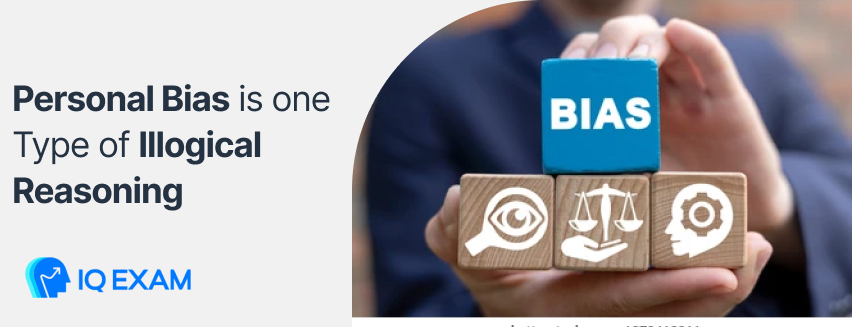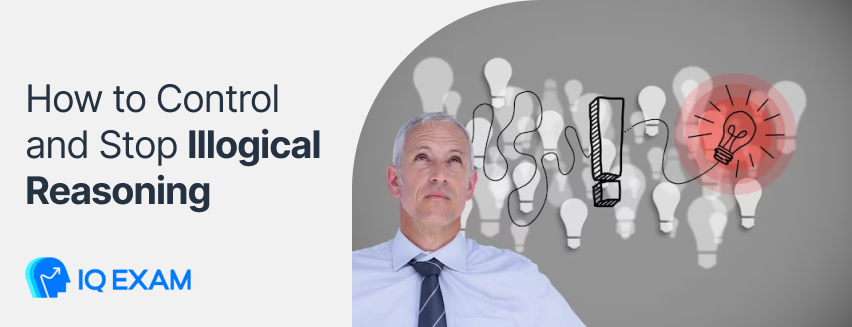
Have you ever listened to someone argue, feeling like there’s something wrong and you can’t accept what they say? Their reasoning might be illogical!
Illogical reasoning can be like solving a puzzle with the wrong pieces and trying to persuade others that they’re the right pieces!
This kind of reasoning means making conclusions or judgments that don’t quite fit together logically.
Whether you want to be good at discussions or you want to understand if is someone arguing logically, you should know what illogical reasoning is, how to identify it, and how to fight it!
We’re going to tell you all about it today! Just scroll down and let us show you how illogical reasoning works!
Understanding Illogical Reasoning
Illogical reasoning means drawing conclusions that don’t follow the rules of logic.
Our minds sometimes identify illogical reasoning very fast; but since logic and philosophy emerged, some people were great at speaking and they could violate the rules of logic, without anyone understanding. This is how close logical and illogical reasoning is!
The Difference Between Logical and Illogical Reasoning
Logical reasoning means making conclusions based on evidence and structured thinking. It includes a rational and clear path in the conversation and relying on logic and facts in conclusion drawing.
On the other hand, illogical reasoning assumes wrongful facts and concludes conversations that are driven by emotions or bias. This kind of reasoning doesn’t have solid foundations and lacks logical structure.
Types of Illogical Reasoning

There are different types of illogical reasoning. Some are easy to identify, and some are identifiable with some attention. However, some types of illogical reasoning are very difficult to distinguish!
Let’s get to know more about types of illogical reasoning and how they each work.
Overgeneralization
Imagine you judge all fruits by the taste of a single apple. You could say I don’t like fruit because all fruits are round, sweet, and not easy to bite! That’s an overgeneralization!
This illogical reasoning means drawing conclusions based on a small sample. So, if someone tells you that their American friend likes burgers and concludes that all Americans like burgers, they’re reasoning illogically!
Illogical Conclusion
If someone’s trying to draw a conclusion based on any solid supporting facts and data, they’re probably making by illogical conclusion.
The conclusion you draw from a discussion must be based on facts.
For example, if someone tells you 90% of people are on Weight Watcher’s diet, so 90% of people need to lose weight, they’re probably drawing an illogical conclusion; because we don’t know if the statistics they used are true.
Imagine someone tells you that you should start a daily routine because it has many benefits and they don’t have any facts to prove those benefits, they’re also using this reasoning style.
Personal Bias

Imagine viewing the world through a distorted lens that only shows one perspective; that’s personal bias!
People who use this technique usually form conclusions based on personal opinions rather than legit information. They have no other proof or reason other than their thoughts.
For instance, if someone tells you women don’t need activism for their rights anymore because the discrimination against them has ended and all men are fair to women, that’s a big red flag shining of bias!
Jumping to Conclusions
Imagine trying to finish a novel by reading only the first page; that’s jumping to conclusions! People who use this illogical reasoning technique, form judgments without sufficient evidence.
So, if someone concludes just by knowing a bit of the story, the discussion on their side won’t be logical. For instance, if someone touches something pointy in your bag without looking at it and concludes that the thing is a needle, they’re jumping to a conclusion.
Because if they take the thing out of your bag, it might be just another pointy thing. Like a pencil, a small knife, or small scissors!
Polarization
Imagine the world is divided into black and white, without even a shade of gray. If you use that in your discussions and see everything as a zero or a hundred, that’s polarization!
This kind of reasoning includes viewing complex issues in a very simplistic, all-or-nothing manner. For instance, people who reason that human beings are the bugs of the universe and they have to just get extinct because they produce much pollution and cause wars, they’re using polarization!
It’s true that human has always inflicted the flames of war and has done dark things. But also, humans created art and philosophy. It learned how to live in cities and it civilized itself. Human beings have a bright side that preserves the environment, keep pets, and produce knowledge.
So human is not black, neither white!
Never Being Wrong
Ever involved in a conversation with someone who insists on their wrong facts and refuses to admit that they might be wrong even with evidence?
They might be using the Never Being Wrong type of illogical reasoning. You’d better stop discussing with these kinds of people because they never accept if they’re wrong.
Spotting Illogical Reasoning

Now, how to know if someone’s using these techniques in a debate? Let’s see how we can detect illogical reasoning and win a discussion!
Methods to Detect Illogical Reasoning
Question Assumptions
When you come across a comment, pause for a moment and ask yourself if this discussion has any assumptions.
If it does, are the assumptions supported by facts? Are they generalized? Are they coming from bias? Are these assumptions scientific?
These are the ABCs for critical thinking. If you practice it a few times, your mind gets used to questioning presumptions in the discussions and finds out illogical reasoning faster!
Examine Evidence

If you’re discussing with someone and they use evidence, facts, and statistics take a moment to look for credible sources that admit those facts.
Are they true? Google anything you don’t know and double-check the info you get. Never accept anything without a source!
Watch for Emotional Appeals
Illogical reasoning often includes emotional manipulation. So, if someone’s playing on your emotions rather than providing solid reasoning, they’re probably reasoning illogically!
Watch out for blushing, high pitch or shaking voices, shaking hands, and eyes that look everywhere but at your eyes! These are signs that show the person you’re discussing with is deeply sank into emotions rather than logic.
Check for Biases
Consider if personal biases are clouding the reasoning. Are there signs of personalization?
Does the person you discuss something with become angry when you want to question their presumptions?
Seek Consistency
So, you’re discussing something with someone, but they keep jumping between conflicting ideas. It’s like a partisan move!
This kind of reasoning lacks consistency. So, always follow the conversation and see if it’s going consistently.
Did you ask them about the discrimination in education, and they answered by talking about positive inequality and how discriminatory it is? If so, they’re not consistent in the discussion and they’re probably not using their logic.
How to Control and Stop Illogical Reasoning

Now that we’ve learned to spot illogical reasoning, let’s learn some effective ways to navigate a rational discussion and stop any kind of illogical reasoning.
Stay Calm and Respectful
Keep your cool, even when faced with illogical arguments. Respond with respect and kindness to maintain a positive atmosphere.
Listen Actively
Truly understanding others’ perspectives is crucial. Listen actively, ask clarifying questions, and show that you value their input.
Provide Evidence
When presenting your arguments, back them up with credible sources and evidence. This sets a strong example for logical reasoning. Always talk by citing great thinkers and solid scientific facts because arguing with those would be pretty difficult!
Avoid Personal Attacks
Don’t go for any kind of personal attacks or derogatory language. Stick to critiquing ideas, not individuals.
Acknowledge Valid Points
If you encounter a valid point within an otherwise illogical argument, acknowledge it. This promotes constructive dialogue.
Use Critical Thinking

Encourage critical thinking by asking open-ended questions that prompt reflection rather than pushing an agenda.
Stay Open-Minded
Be open to changing your views if presented with sound reasoning and evidence. Avoid rigid, dogmatic thinking.
Fact-Check Before Sharing
Before reposting or sharing information, verify its accurate! Misinformation can fuel illogical reasoning.
Report Violations
On platforms like Instagram, report instances of hate speech, harassment, or abuse. Promote a safe and respectful online environment.
Lead by Example
Model logical reasoning and respectful communication in your online interactions. Others may follow you!
Frequently Asked Questions
What is illogical reasoning?
Illogical reasoning means drawing conclusions that don’t align with logical thinking. Your mind probably detects it automatically even if you don’t know what’s wrong.
How can I identify illogical reasoning?
You can identify illogical reasoning by questioning assumptions, examining evidence, watching for emotional appeals, checking for biases, and looking for consistency. These methods help you identify when someone’s using illogical reasoning.
What are some common types of illogical reasoning on Instagram?
Overgeneralization, illogical conclusions, personal bias, jumping to conclusions, polarization, personalization, and never being wrong are common types of illogical reasoning.
How can I control and stop illogical reasoning in my online interactions?
If you’re engaging in an online debate, stay calm and respectful, provide evidence for your arguments, never attack someone’s personality, and don’t make it personal. Pointing out valid points and staying open-minded help you as well.
How can I politely challenge someone’s illogical reasoning in a discussion or debate?
Start by acknowledging their valid points, then present your argument followed by evidence and logical reasoning. Use respectful language, and ask open-ended questions. Listen carefully when they talk and keep calm.
Are there any online resources or courses available to improve critical thinking skills and combat illogical reasoning?
There are many online resources and courses available to improve critical thinking skills. These resources include free online courses, books, and websites that offer exercises for enhancing logical reasoning and critical thinking.
Conclusion
This time when you’re engaged in a debate, you know how to discover when someone’s talking against logical rules, and you know how to handle it!
Many people discuss things in a way that manipulates your mind, making you accept their reasoning. But all they do is trick logical thinking.
So, try improving your critical thinking skills. This helps you identify illogical reasoning without losing time. This skill includes questioning everything, and checking the facts and statistics you hear in a discussion!
Also, use other signs that we covered in this guide to fight against people who want to persuade you by tricking your logical mind. This way, you’re the one who asks real questions, wants proof, and checks facts. You’re the one who shapes the discussion!
Just remember to keep calm if someone uses illogical reasoning tactics on you! Don’t make the conversation personal, don’t lose your temper, and don’t leave the debate! Just navigate the talk the way you want, and ask them questions that they can’t pass with a little reasoning.
By practicing logical thinking, promoting respectful communication, and encouraging others to do the same, we can have a rational discussions! Then, together, we can build a community when sounding logical is the way to being heard!
